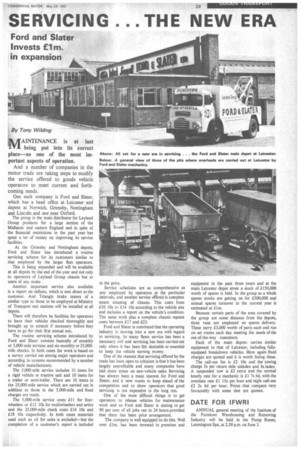SERVICING THE NEW ERA
Page 31

If you've noticed an error in this article please click here to report it so we can fix it.
Ford and Slater Invests m. in expansion
By Tony Wilding
MAINTENANCE is at last being put into its correct place—as one of the most im
portant aspects of operation.
And a number of companies in the motor trade are taking steps to modify the service offered to goods vehicle operators to meet current and forthcoming needs.
One such company is Ford and Slater, which has a head office at Leicester and depots at Norwich, Grimsby, Nottingham and Lincoln and one near Oxford.
The group is the main distributor for Leyland Group products for a large section of the Midlands and eastern England and in spite of the financial restrictions in the past year has spent a lot of money on improving its service facilities.
At the Grimsby and Nottingham depots, Ford and Stater has introduced a routine servicing scheme for its customers similar to that employed by the larger fleet operators.
This is being expanded and will be available at all depots by the end of the year and not only to operators of Leyland Group chassis but to users of any make.
Another important service also available is a report on defects, which is sent direct to the customer. And Triangle brake testers of a similar type to those to be employed at Ministry of Transport test stations will be installed at all depots.
There will therefore be facilities for operators to have their vehicles checked thoroughly and brought up to scratch if necessary before they have to go for their first annual test.
The routine servicing scheme introduced by Ford and Slater consists basically of monthly or 5,000-mile services and six-monthly or 25,000mile checks. In both cases the work is based on a survey carried out among major operators and according to systems recommended by a number of vehicle manufacturers.
The 5,000-mile service includes 31 items for a rigid vehicle or tractive unit and 10 items for a trailer or semi-trailer. There are 10 items in the 25,000-mile service which are carried out in addition to those in the 5,000-mile and fixed charges are made.
The 5,000-mile service costs £11 for fourwheelers or £12 lOs for multiwheelers and attics and the 25,000-mile check costs £16 lOs and £18 lOs respectively. In both cases materials used such as oil for units is excluded—but the completion of a customer's report is included in the price.
Service schedules are as comprehensive as any employed by operators at the particular intervals, and another service Offered is complete steam cleaning of chassis. This costs from £10 !Os to £14 lOs according to the vehicle size and includes a report on the vehicle's condition. The same work plus a complete chassis repaint costs between £17 and £23.
Ford and Slater is convinced that the operating industry is moving into a new era with regard to servicing. In many fleets service has been a necessary evil and servicing has been carried out only where it has been felt desirable or essential to keep the vehicle earning money.
One of the reasons that servicing offered by the trade has been open to criticism is that it has been largely unprofitable and many companies have laid more stress on new-vehicle sales. Servicing has always been a main interest for Ford and Slater, and it now wants to keep ahead of the competition and to show operators that good servicing is not expensive in the long run.
One of the most difficult things is to get Operators to release vehicles for maintenance work and so Ford and Slater is aiming to get 90 per cent of all jobs out in 24 hours provided. that there has been prior arrangement.
The company is well equipped to do this. Well over £1m. has been invested in premises and equipment in the past three years and at the main Leicester depot alone a stock of £150,000 worth of spares is held. In the group as a whole spares stocks are getting on for £500,000 and annual spares turnover in the current year is estimated at Lim.
Because certain parts of the area covered by the group are some distance from the depots, three vans are employed on spares delivery. These carry £3,000 worth of path each and run on set routes each day meeting the needs of the out-of-the-way customers.
Each of the main depots carries similar equipment to that of Leicester, including fullyequipped breakdown vehicles. Here again fixed charges are quoted and it is worth listing these.
The call-out fee is £2 lOs and the' towing charge 5s per return mile unladen and 6s laden. A suspended tow is £2 extra and the normal hourly rate for a mechanic is £1 7s 6d, with the overtime rate £1 15s per hour and night call-out £2 2s 6d per hour. Prices that compare very favourably with some that are quoted.
.DATE FOR IFWRI
ANNUAL general meeting of the Institute of the Furniture Warehousing and Removing Industry will be held in the Pump Room, Leamington Spa, at 2.30 p.m. on June 3.












































































































